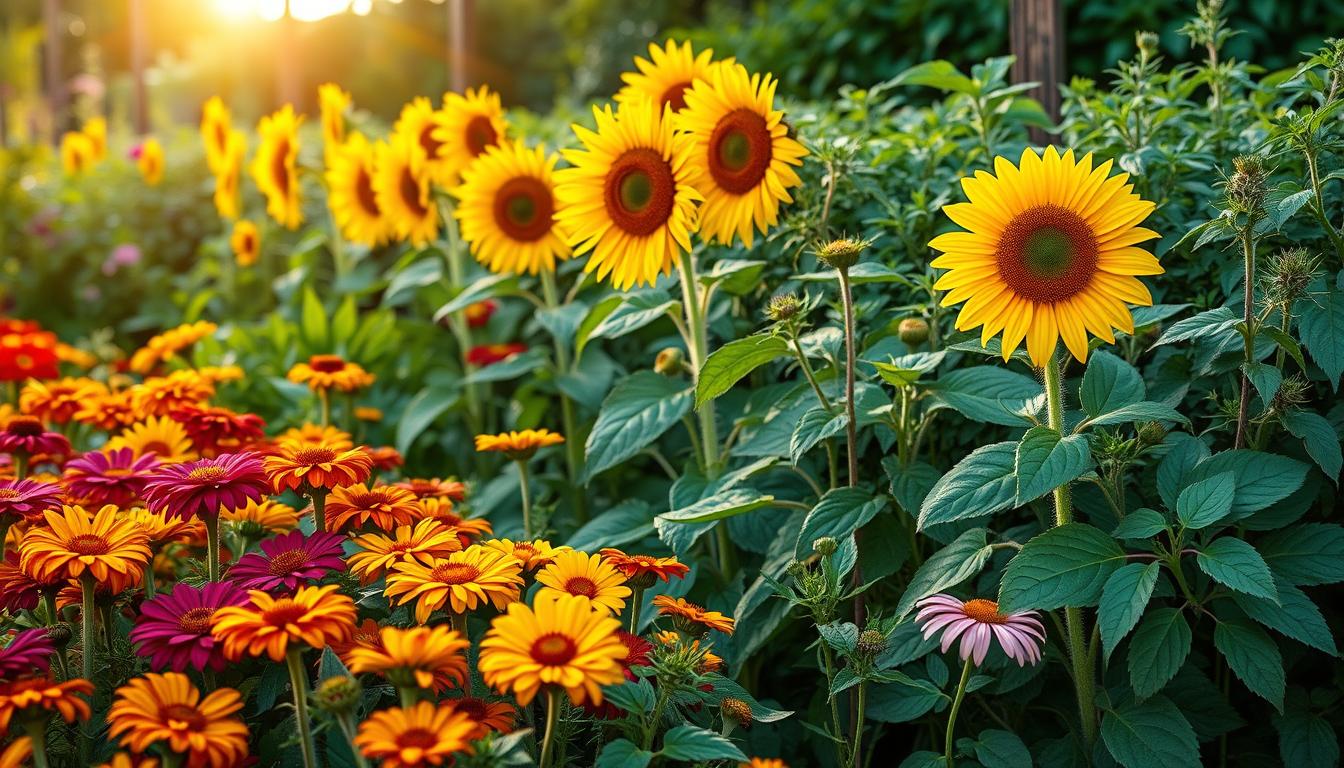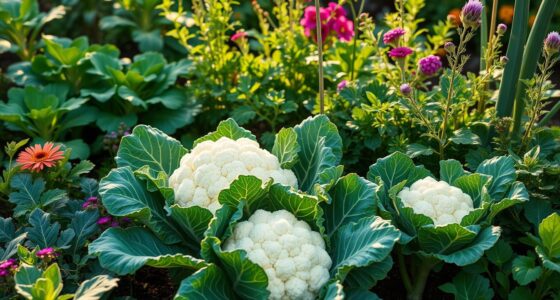Have you ever stood in front of a sunflower, captivated by its vibrant yellow petals and towering stature? Sunflowers not only bring joy to your garden but also possess the power to transform your gardening experience when paired with the right companions. By exploring companion plants for sunflowers, you can create a thriving ecosystem in your backyard that enhances both their growth and your personal satisfaction. This guide will help you discover the best plants to grow with sunflowers, ensuring a colorful and productive space while guiding you to cultivate friendships among plants that benefit each other. Get ready to unlock the potential of your garden with sunflower planting companions that will inspire you.
Key Takeaways
- Understanding companion plants for sunflowers can enhance growth.
- Sunflowers benefit from pairing with both herbs and vegetables.
- Effective pest control comes through strategic companion planting.
- Pollinators are attracted to various flowers that complement sunflowers.
- Soil health improves with the right companion plants.
- Proper spacing and care are essential for a thriving garden.
Understanding Companion Planting
Companion planting is a gardening technique that combines different plant species to promote mutual growth and health. Engaging in sunflower companion planting offers a strategic method to enhance your garden’s productivity while providing benefits such as natural pest control and improved pollination.
What is Companion Planting?
In essence, companion planting involves planting two or more types of plants close to each other, allowing them to support one another in various ways. This practice can significantly improve plant growth, deter pests, and optimize the use of garden space. When you choose the right companions, you create an environment where plant health is encouraged, and yields are potentially increased.
Benefits of Companion Planting
Utilizing companion planting can enhance your gardening experience and results. The benefits include:
- Natural pest control: Certain plants can repel pests that may harm others.
- Improved plant growth: Neighboring plants often boost each other’s growth through a variety of interactions.
- Efficient use of space: A well-thought-out arrangement can maximize available garden area.
- Increased pollinator attraction: Planting varieties that attract bees and other pollinators can enhance overall garden productivity.
Sunflowers as Companion Plants
Sunflowers stand out as excellent companions in a garden. Their height provides shade for shorter plants, while their vibrant blooms attract vital pollinators. Additionally, sunflowers can help deter certain pests, making them suitable for various garden plants. By incorporating sunflower garden companions, you establish a dynamic ecosystem that supports growth and resilience in your garden.
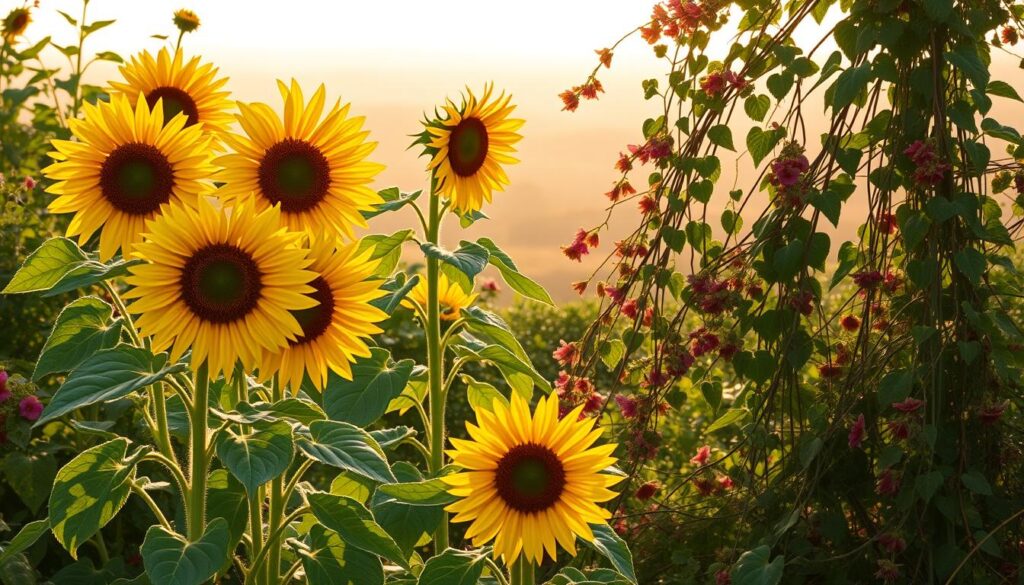
Best Companion Plants for Sunflowers
Creating a thriving sunflower garden involves selecting the right companions. By pairing sunflowers with complementary herbs, vegetables, and flowers, you can enhance both their growth and aesthetic appeal. Here are some excellent choices for sunflower friendly plants.
Herbs That Pair Well with Sunflowers
Incorporating herbs like basil and chives can be highly beneficial in your sunflower garden pairings. These herbs not only thrive beside sunflowers but also serve practical purposes. Basil, in particular, is known for repelling pests while luring in beneficial pollinators, contributing to a healthier garden environment.
Vegetable Companions for Sunflowers
Tomatoes and peppers make ideal vegetable companions for sunflowers. The tall stalks of sunflowers provide necessary shade during the hot summer months, benefiting these plants. Zucchinis can also grow robustly next to sunflowers, taking advantage of their height for support, creating a harmonious growing space.
Flowers That Complement Sunflowers
Brighten your garden with vibrant flowers such as zinnias and Shasta daisies. These sunflower friendly plants not only enhance the overall beauty of your garden but attract various pollinators, promoting a lively ecosystem among your plants.

Companion Plants That Deter Pests
Incorporating pest-repelling plants into your garden can enhance the health and vitality of your sunflowers. Choosing the right sunflower companion plants not only beautifies your space but also helps to keep unwanted insects at bay. Here are some of the best plants to grow with sunflowers that effectively deter pests.
Marigolds: Nature’s Pest Control
Marigolds are well-known for their ability to repel harmful insects, including nematodes and aphids. When planted near sunflowers, these vibrant flowers don’t just protect; they also add a splash of color to your gardening landscape. The presence of marigolds may lead to healthier sunflowers and a more abundant harvest.
Basil: A Fragrant Defense
Basil offers both culinary benefits and pest-repellent properties when placed alongside sunflowers. This aromatic herb can repel mosquitoes, whiteflies, and beetles. Cultivating basil in your garden means you can enjoy fresh herbs while also protecting your sunflower companion plants from common pests.
Nasturtiums: Edible and Protective
Nasturtiums act as an effective trap crop for pests, luring them away from your sunflowers. Their colorful blooms add charm to your garden while providing a natural defense against harmful insects. In addition to pest control, nasturtiums are edible, making them a versatile choice for your gardening strategy.
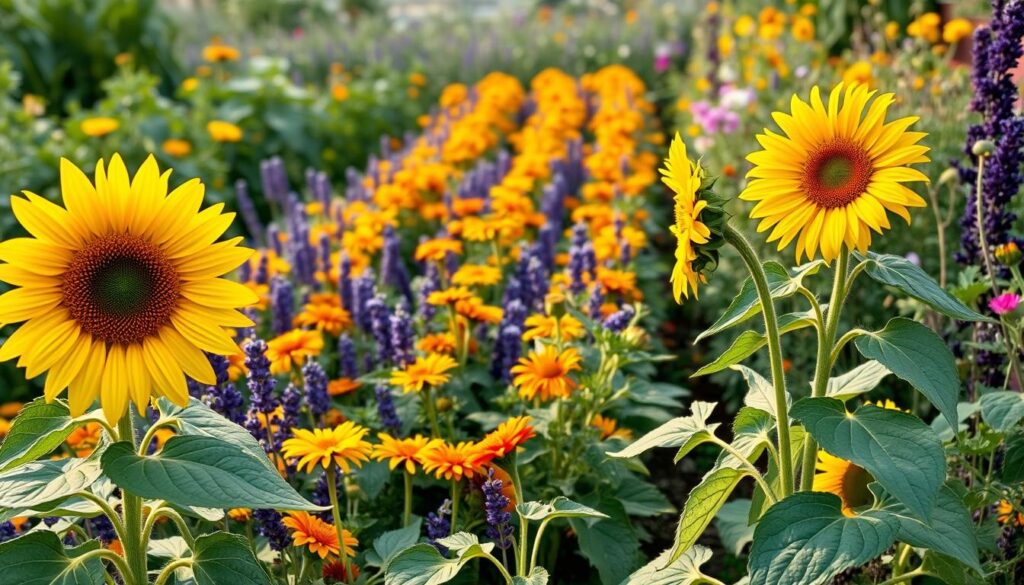
| Companion Plant | Pest Repelled | Additional Benefits |
|---|---|---|
| Marigolds | Nematodes, Aphids | Brightens garden, attracts beneficial insects |
| Basil | Mosquitoes, Whiteflies, Beetles | Culinary herb, fragrant addition |
| Nasturtiums | Various pests (trap crop) | Edible flowers, suppresses weeds |
Companion Plants That Attract Pollinators
Creating a thriving sunflower garden requires not only careful plant selection but also attracting beneficial pollinators. The right companions can enhance your garden’s aesthetics while promoting pollination for sunflowers and other plants. Below are some excellent choices for your sunflower companion planting.
Bee Balm: A Magnet for Bees
Bee balm is a standout in any sunflower garden due to its aromatic foliage and vibrant flowers. This plant not only attracts bees but also draws in other beneficial insects, thereby boosting the pollination rates of your sunflowers and nearby plants. Its presence can significantly improve the overall health of your garden ecosystem.
Zinnias: Brighten Up Your Garden
With their bold colors and long-lasting blooms, zinnias serve as an attractive addition to your sunflower garden companions. These flowers are particularly effective at luring in various pollinators, including butterflies and hummingbirds, enhancing the visual appeal and ecological balance of your garden.
Lavender: Lovely and Beneficial
Lavender stands out not only for its stunning purple flowers but also for its pleasant aroma. This perennial herb attracts a diverse array of pollinators. Including lavender in your sunflower companion planting will foster a more vibrant and healthy garden environment, which benefits all your plants.

Companion Plants for Soil Health
Maintaining healthy soil is crucial for the growth of sunflowers and other plants in your garden. By incorporating specific plants known for their soil-enhancing properties, you can provide essential nutrients and improve soil structure. Consider these exceptional companion plants for sunflowers that bolster soil health.
Clovers: Nitrogen Fixers
Clover is an excellent choice among sunflower planting companions. It enriches the soil with nitrogen, which is essential for plant growth. By planting clover, you can enhance overall soil fertility, ensuring your sunflowers and other plants thrive. Additionally, clover’s ability to self-replenish nitrogen makes it a sustainable option for your garden.
Beans: Replenishing Nutrients
Beans serve as another fantastic option for improving soil health. As nitrogen-fixing plants, they work harmoniously with sunflowers to replenish nutrients in the soil. Integrating beans into your gardening routine not only enhances the nutrient content but also promotes a balanced ecosystem, ensuring your sunflowers become robust and vibrant.
Spinach: A Ground Cover Champion
Spinach acts as a remarkable ground cover that benefits sunflower planting companions. It reduces soil temperature and moisture evaporation while minimizing weed growth. This leafy green not only supports sunflower health but also contributes to maintaining soil moisture, making your gardening efforts more effective.
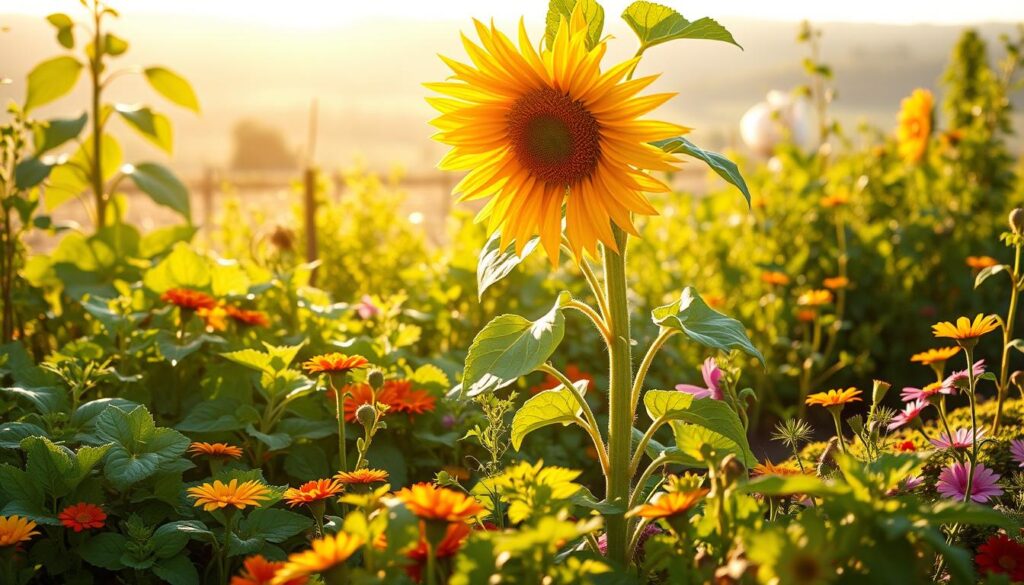
Spacing and Planting Techniques
Creating the ideal environment for sunflowers involves adopting proper spacing and planting techniques. By considering how you arrange sunflower garden pairings with companion plants, you can maximize both space and productivity. Understanding these techniques contributes to healthy growth and a flourishing garden.
Ideal Spacing for Sunflowers
To allow sunflowers to thrive, it’s crucial to give them adequate room. Ideally, plant sunflowers about 18-24 inches apart. This spacing minimizes competition for nutrients, sunlight, and water. Proper spacing also enables each sunflower to reach its full height and display its vibrant blooms, enhancing the visual appeal of your garden.
Layering Companion Plants
Incorporating shorter companion plants alongside or beneath your sunflowers can maximize vertical space. The best plants to grow with sunflowers include a variety of herbs and dwarf flowers. By planting these shorter companions, you protect soil moisture and create a lush, layered garden that attracts beneficial insects.
Companion Planting Patterns
Experimenting with different companion planting patterns will yield exciting results. Consider layouts such as blocks, rows, or interplanting strategies that optimize sunlight and resources. These methods enhance the relationships between plants, encouraging healthier growth and a vibrant sunflower garden.
| Spacing Technique | Description | Best Plants |
|---|---|---|
| Traditional Spacing | Planting sunflowers 18-24 inches apart for optimal growth. | Sunflowers only |
| Layering | Planting shorter companions underneath for moisture retention. | Basil, marigolds, herbs |
| Interplanting | Utilizing diverse arrangements to enhance growth. | Zinnias, bee balm, and low-growing vegetables |

How to Care for Companion Plants
Caring for your sunflower friendly plants involves understanding their specific needs. Proper maintenance ensures that both sunflowers and their companions thrive together. Follow these guidelines to keep your garden flourishing.
Watering Guidelines
Regular watering is crucial, especially when plants are establishing their roots. Aim for consistent moisture, allowing the soil to dry slightly between watering sessions for optimal growth. Overwatering can lead to root rot, so be mindful not to saturate the soil.
Sunlight Requirements
Sunflowers thrive best in full sun, requiring around 6 to 8 hours of direct sunlight each day. Selecting sunflower friendly plants that share similar light preferences will promote healthy growth across your garden. Ensure that all selected companion plants can thrive under these conditions.
Fertilizing Your Garden
To support vigorous growth, enrich your soil with compost before planting. Using a balanced fertilizer during the growing season enhances nutrient availability. This step is essential for both your sunflowers and the surrounding companion plants, ensuring that they receive the nourishment needed to flourish.
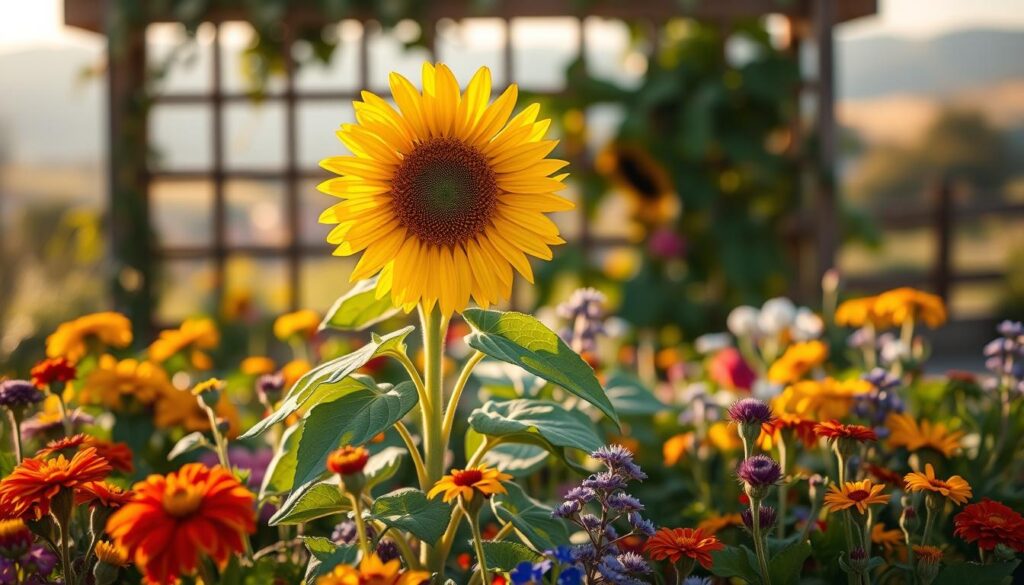
Seasonal Considerations for Companion Planting
Understanding the seasonal dynamics of your garden enhances growth and yields. Tailoring your approach to sunflower planting companions allows you to optimize your garden throughout the year. Seasonal strategies ensure the right companion plants for sunflowers flourish, contributing to overall garden health.
Spring Planting Strategies
Spring marks the perfect time to begin your sunflower planting. After the last frost, plant sunflowers along with companion plants that thrive in rising temperatures. Consider including plants like basil, which not only pairs well with sunflowers but also benefits from the warming soil. A harmonious start in spring sets the stage for a fruitful season.
Summer Companions
As the sunflowers reach their peak summer growth, heat-loving vegetables and herbs come into play. Plant companions such as peppers and tomatoes that can withstand the warm conditions. They not only enhance the aesthetic appeal of your garden but also create a nurturing environment for sunflower planting companions. The combination supports biodiversity and enriches the growing ecosystem.
Fall Garden Transitions
Transitioning into fall, it’s crucial to plan the next steps for companion plants that can tolerate cooler weather. Consider crops like kale and garlic that complement sunflowers while improving soil health. Proper crop rotation with sunflower planting companions maximizes nutrient use and prevents soil depletion, paving the way for a fruitful garden year after year.
| Season | Strategies | Companion Plants for Sunflowers |
|---|---|---|
| Spring | Begin planting post-frost | Basil, Marigolds |
| Summer | Focus on heat-tolerant crops | Peppers, Tomatoes |
| Fall | Plan for cooler-weather plants | Kale, Garlic |

Common Mistakes in Companion Planting
When cultivating companion plants for sunflowers, it is essential to recognize common pitfalls that can hinder the growth and vitality of your garden. Learning from these mistakes will help ensure that your sunflower companion plants flourish and contribute positively to your gardening experience.
Overcrowding Your Garden
Planting too many companion plants too close to your sunflowers can lead to serious competition for resources. Sunflowers need ample light, water, and nutrients to thrive. Overcrowding can stifle the growth of your sunflowers and their companions. Consider leaving enough space between each plant to promote healthy growth and development.
Ignoring Plant Needs
Every plant comes with its unique set of requirements. Pay attention to the individual needs of your companion plants for sunflowers. Different species may prefer varying soil types, moisture levels, and sunlight exposure. Failure to accommodate these requirements could result in weak growth or even plant failure.
Poor Plant Selection
Choosing the right companion plants is crucial. Assess how certain plants will interact with sunflowers. Avoid planting species known to compete for nutrients or inhibit sunflower growth, such as potatoes and pole beans. Curating a thoughtful selection of sunflower companion plants will enhance your garden’s overall harmony and productivity.

Troubleshooting Companion Planting Issues
Gardening comes with its own set of challenges, especially when it involves sunflower friendly plants and their companions. Identifying potential issues early can help ensure a healthy garden environment. Here are some common problems and solutions to keep your sunflower garden companions thriving.
Identifying Pest Problems
Regular inspections of your garden are crucial for spotting pests. Look for signs such as discolored leaves or small holes on plant surfaces. Common culprits like aphids or spider mites can weaken your sunflowers and their sunflower garden companions if not addressed promptly. A simple solution may include introducing natural predators like ladybugs or using insecticidal soap.
Dealing with Disease
Avoiding plant diseases involves creating an optimal growing environment. Ensure good airflow around your plants, which helps reduce humidity and prevent fungal issues. Always dispose of any diseased plants immediately, as this can prevent the spread to your sunflower friendly plants and other garden companions.
Remedies for Nutrient Deficiency
Nutrient deficiencies can stunt growth in sunflowers and their companions. To remedy this, consider applying organic soil amendments like compost or using organic fertilizers. These can replenish essential nutrients and promote robust growth among your sunflower garden companions, enhancing overall garden health.
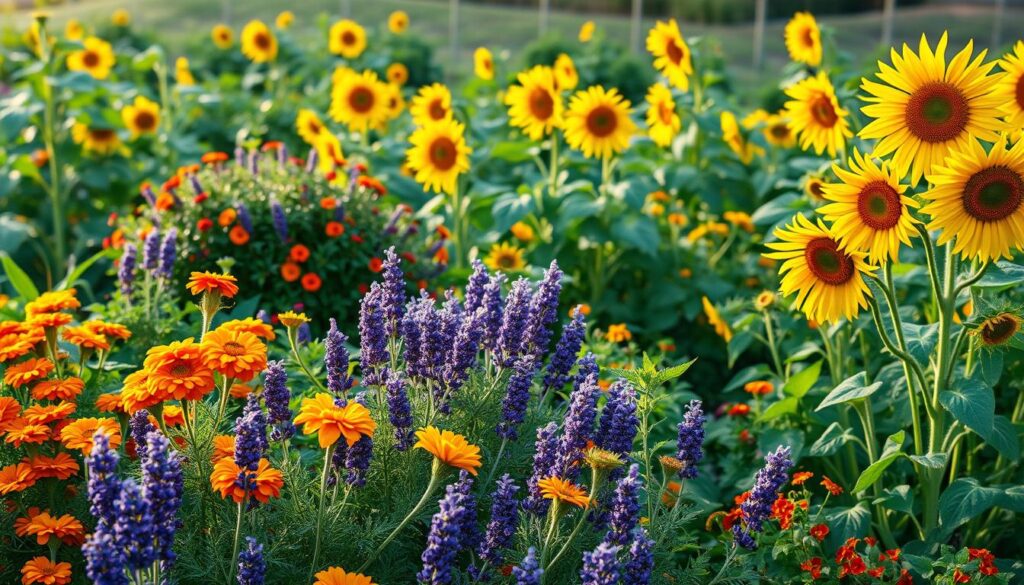
Harvesting and Enjoying Your Sunflower Companions
Engaging in sunflower companion planting yields not only visual beauty but also a bountiful harvest. Knowing when to pick your companion plants can elevate your culinary and crafting experiences. This section guides you on the timing of your harvest, how to incorporate fresh produce into your meals, and creative ways to use sunflowers and their vibrant companions.
When to Harvest Companion Plants
Determining the optimal time to harvest is crucial for enjoying the best flavors and freshness of your garden produce. For instance, basil should be picked before it flowers to maintain its robust flavor. Tomatoes generally reach their peak flavor when they fully ripen on the vine. With zinnias, harvest the blooms when they fully open to enjoy their vibrant colors in arrangements.
Cooking with Fresh Herbs and Vegetables
Integrating your harvested herbs and vegetables into meals enhances both taste and nutrition. Fresh basil can elevate a classic tomato sauce, while roasted zucchinis and peppers add a delightful crunch to any dish. Experiment with various combinations to discover your favorite flavors among the best plants to grow with sunflowers.
Crafting with Sunflowers and Their Friends
Your garden’s treasures extend beyond the kitchen. Sunflowers, paired with colorful companions, can serve as perfect materials for seasonal crafts. Create stunning flower arrangements for your home or dry blooms for long-lasting displays. Let your creativity flourish as you enrich your living space with the beauty of sunflower companion planting.
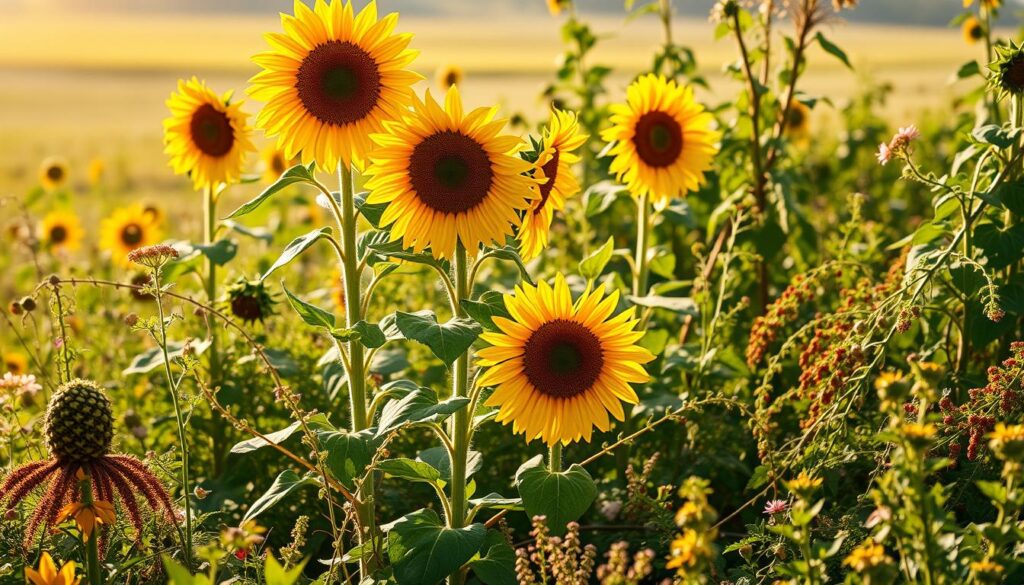
Resources for Companion Planting
Exploring various resources can significantly enhance your knowledge and skills in companion planting, especially when focusing on sunflower garden pairings. Engaging with books, online platforms, and local communities helps you to discover effective strategies and enrich your gardening experience.
Books on Companion Planting Techniques
Numerous books provide in-depth insights into companion planting techniques specifically tailored to boost your sunflower gardening. Titles such as “Carrots Love Tomatoes” by Louise Riotte and “The Companion Planting Handbook” by Michael MacCaskey offer practical guidance and innovative pairing suggestions.
Online Forums and Communities
Joining online forums and communities is an excellent way to connect with fellow gardening enthusiasts. Websites like GardenWeb and Reddit’s r/gardening feature numerous discussions on companion plants for sunflowers. Sharing experiences and gathering advice enhances your sunflower garden pairings while building friendships in the gardening world.
Local Gardening Clubs and Workshops
Participating in local gardening clubs or workshops provides hands-on learning experiences regarding companion planting. Collaborating with your community fosters personal connections and offers practical tips tailored to your specific growing conditions.

Conclusion: Maximizing Your Garden’s Potential
As you venture into sunflower companion planting, you will quickly appreciate the myriad benefits that companion plants bring to your garden. These relationships can lead to enhanced growth for sunflowers, improved pest control, and more efficient use of resources like sunlight and water. By pairing sunflowers with compatible plants, you set the stage for a thriving garden ecosystem that not only looks beautiful but also promotes the health of each plant.
Don’t hesitate to explore various combinations of sunflower friendly plants in your space. Experimentation is key! You may discover unique partnerships that flourish in your specific environment, providing you with bountiful yields and vibrant blooms. Remember that each garden is different and what works in one setting might not work in another. Enjoy the process of trial and error, and take notes on what thrives.
To ensure successful companion planting, prioritize nurturing both your sunflowers and their plant partners. Regularly prune, maintain consistent watering, and rotate your plant selections with each season. By doing so, you will create an optimal environment that maximizes the potential of your sunflower companion plants. Happy gardening!
